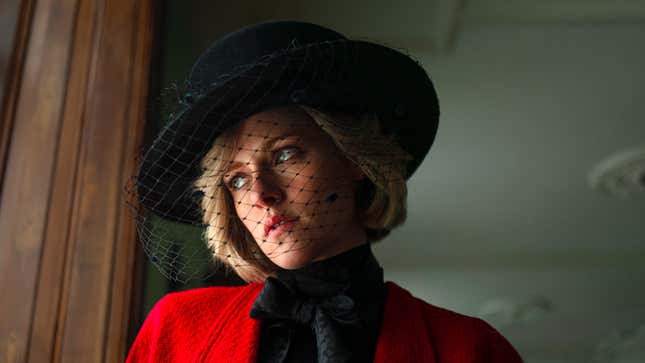
Sandringham Estate was once called “the most comfortable home in England.” Never mind that it was working toilets that earned the decadent Norfolk manor, where the royal family has spent the Christmas holiday for decades now, such a reputation; as modern plumbing became less of a luxury and more of a standard, the description stuck. But so, too, have rumors that the place is haunted. It’s those that echo through the halls of the estate in Spencer, Pablo Larraín’s handsome, mannered new psychodrama about the crumbling marriage of Princess Diana. Viewed, early on, from a downright Kubrickian overhead vantage, to emphasize the staunch rigidity of its architecture and routines, the mighty house has all the cozy charm of The Overlook. No one seems comfortable here. Not even the guests of honor.
Among them, of course, is Diana (Kristen Stewart), present by national obligation, sons in tow. For her, the estate is a gilded cage. She has been instructed to keep the blinds closed, ostensibly to shield the country’s most famous family from the snapping cameras of the paparazzi—which is to say, from the vultures many would later deem responsible for her death. But their eyes pry no more fiercely than those of Major Alistar Gregory (Timothy Spall), the ex-military man whose responsibility to keep the press at bay extends to constant, vigilant surveillance of the Princess Of Wales. And then there are the in-laws, peering with silent, stony judgment over their meals. They might as well be actual apparitions, for all they’re humanized here.
Spencer is set almost entirely on the grounds of Sandringham, and over just three days, from Christmas Eve to Boxing Day, most likely circa 1991. No huge headlines were made over the holiday; it is not the most obvious stretch of incident for a biopic to dramatize. The idea is that we’re seeing an unpublicized chapter of personal history: a speculative portrait of the moment when Diana, a decade into her failing marriage, made the tough decision that she had to escape the royal family and all the oppressive scrutiny, expectation, and condescension that came with her position within it.
“A fable from a true tragedy,” the opening text promises, promisingly. Yet Spencer is airless as drama, every bit as hemmed in by its schematic design as Diana is by her life in the blinding spotlight. The problems begin with Stewart, an often terrific actor struggling to disappear into her role here. It’s hardly the end of the world that she doesn’t much look or sound like Diana, that she hasn’t mastered the mannerisms or the accent. In lieu of a convincing impersonation, however, what we mostly get is studied, breathy neurosis: a caricature of frazzling nerves. Stewart never seems to find an emotional reality for the icon she’s playing; the resonance begins and ends with the stunt casting of one hounded target of the bursting flashbulbs as another.
Once before has Larraín torn back the curtain of a dynastic dream life to find a nightmare there instead, and gone searching for the real person behind the famous woman behind the famous man. But his Jackie benefitted from the gut-wrenching urgency of the news it covered, and the arrestingly, disorientingly subjective lens through which it viewed them. Spencer is stuck in that big house, and with a psychological profile that reads like a list of tabloid fixations: the struggles with bulimia (those famous Sandringham toilets do make an appearance after all) and self-harm; the spats with an icy, highly divorceable Charles (Jack Farthing); biopic-mandated family baggage. The film can regard the whispers of Diana “cracking up” as ruthless gossip, while still indulging them through cameos by the specter of Anne Boleyn and hallucinations of Diana’s lone confidante (Sally Hawkins) among the help.
It all stinks of Steven Knight, the British screenwriter of Locked Down, Locke, and some films without “locke” in the title, who never met a theme he couldn’t work out endlessly for us. Every character in Spencer seems in danger of unpacking the full significance of their existence aloud. “There has to be two of you,” one Sandringham staffer tells Diana, helpfully defining the public-private duality of her role. Later, the Queen herself pops by to explain that you don’t just appear on currency, you are currency. When the dialogue doesn’t do the heavy lifting, there’s a scarecrow or an old jacket or a flock of pheasants or another old house over the hill to shoulder it. The film feels pre-analyzed, its ideas all laid out as neatly as the spread at the royal Christmas dinner.

Spencer’s arc is of liberation: By the end, Diana—literally born into nobility, but never mind—stands like a defiant pillar of realness, facing down the barrels of her stilted, stifling relatives by marriage. It’s very nearly slobs versus snobs, complete with a bucket of unpretentious (and un-regurgitated) KFC and Mike + The Mechanics on the radio, a rejoinder to that stuffy string quartet playing over supper. Spencer is never intentionally so funny, though it does hint at the absurdities of royal life a more mischievous filmmaker might make a yuletide feast out of: a line of dogs exiting a limo, the tradition of weighing guests to make sure they’ve put on three pounds of holiday “enjoyment,” etc.
One is left to admire the textures, the way Larraín at once delivers and undercuts the glamour of his extravagant setting. Spencer was shot on celluloid by Portrait Of A Lady On Fire’s Claire Mathon, and it has a sometimes gauzy, beatific glow that suits Diana’s feelings of drowning in decorum, the rules enveloping her as surely as the billowy dresses it’s insisted she wears. Larraín has also commissioned a typically hypnotic score from Jonny Greenwood, whose almost free-jazz noodling here might be better suited to a wilder, less cleanly managed character study. Or at least one that found a better window into the haunted house of Diana’s head.